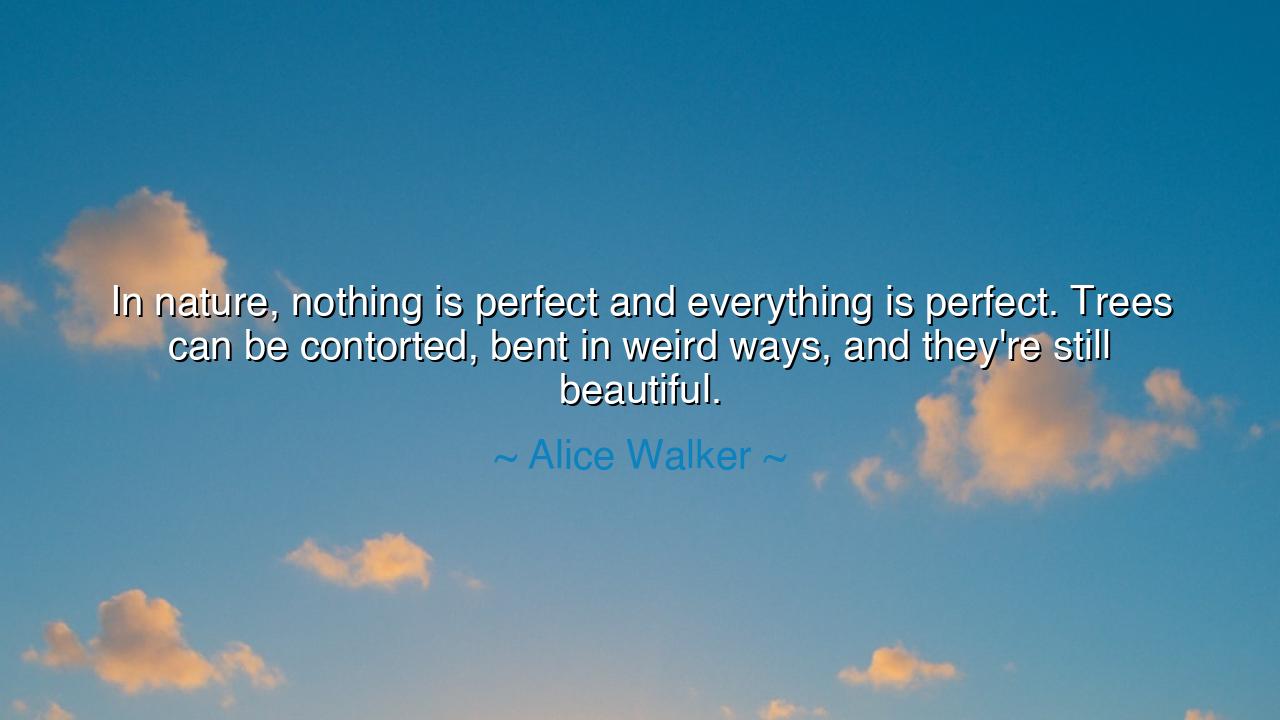
In nature, nothing is perfect and everything is perfect. Trees
In nature, nothing is perfect and everything is perfect. Trees can be contorted, bent in weird ways, and they're still beautiful.






The words of Alice Walker—“In nature, nothing is perfect and everything is perfect. Trees can be contorted, bent in weird ways, and they're still beautiful”—carry the voice of wisdom that is both tender and unshakable. She reminds us that perfection is not found in symmetry or flawless form, but in the authenticity of being itself. In nature, what appears broken, twisted, or strange is not a flaw but a testament to survival, resilience, and beauty. To look at a crooked tree and call it beautiful is to see with the eyes of truth, not the illusions of a world obsessed with uniformity.
The origin of this insight comes from the eternal lessons of the natural world. For millennia, human beings have walked among forests, rivers, mountains, and seas, learning not only survival but also philosophy from them. A storm-scarred tree still grows tall. A river bends and twists, yet it flows ever forward. Flowers bloom unevenly, yet each is wondrous in its own way. Walker, like the sages before her, draws from this eternal book of nature to remind us that beauty does not demand perfection, and imperfection does not deny worth.
History itself testifies to this truth. Consider the ancient Japanese art of kintsugi, the mending of broken pottery with veins of gold. What was cracked and shattered becomes more precious for having been broken. This philosophy mirrors Walker’s insight: imperfection is not the enemy of beauty, but its companion. Just as bent trees remain beautiful, so too do scarred lives carry a dignity greater than those untouched by hardship. In both art and nature, wholeness is not found in flawlessness, but in authenticity and endurance.
The emotional force of Walker’s words lies in their challenge to human vanity. We so often despise ourselves for our crookedness, our scars, our weaknesses. We forget that, like the trees, our contortions are proof of survival. The twisted oak has grown against storms, the bent willow has endured winds, and their forms tell stories of strength. So it is with people. Our struggles bend us, our grief marks us, our failures scar us—but in them lies our beauty. To recognize this is to live not in shame, but in reverence for the resilience of the human spirit.
There is also something heroic in this teaching. For it calls us to abandon false ideals of perfection that enslave us. Empires have fallen chasing after imagined ideals of flawless order. Individuals have been crushed by the pursuit of impossible beauty or power. Yet nature has never required such illusions. She thrives in diversity, in crookedness, in imbalance that still forms balance. Walker’s words call us to embrace this heroic truth: that life is not about being flawless, but about being alive, authentic, and resilient.
The lesson for us is clear: we must learn to see beauty where once we saw only flaws. In ourselves, in others, in the world around us, let us look with the eyes of reverence. The scar is proof of healing. The crooked branch is proof of endurance. The imperfection is proof of life itself. When we embrace this truth, we free ourselves from the tyranny of false perfection and find joy in the imperfect miracle of existence.
What, then, shall we do? Let us walk into nature and observe with new eyes. Let us see the bent trees, the rugged stones, the uneven blossoms, and whisper: “Beautiful.” Let us speak the same blessing over ourselves and over others, especially those who feel broken or unworthy. Let us build a culture that honors resilience over flawlessness, authenticity over appearance, compassion over criticism. In this way, the wisdom of Walker becomes not only a reflection but a revolution of the spirit.
Thus, Alice Walker’s words endure as an eternal teaching: in nature, nothing is perfect and everything is perfect. The crooked, the scarred, the bent, the strange—all belong, all shine with beauty. To understand this is to understand life itself: that perfection is not the absence of flaw, but the presence of truth. And when we live by this vision, we walk with humility, courage, and joy, knowing that, like the trees, we are beautiful in our becoming.






AAdministratorAdministrator
Welcome, honored guests. Please leave a comment, we will respond soon